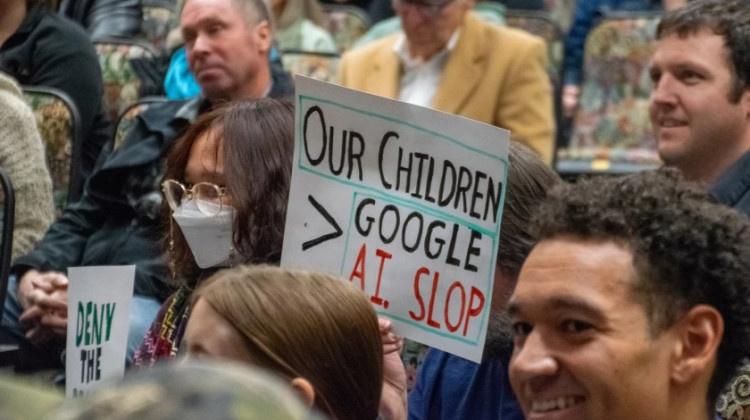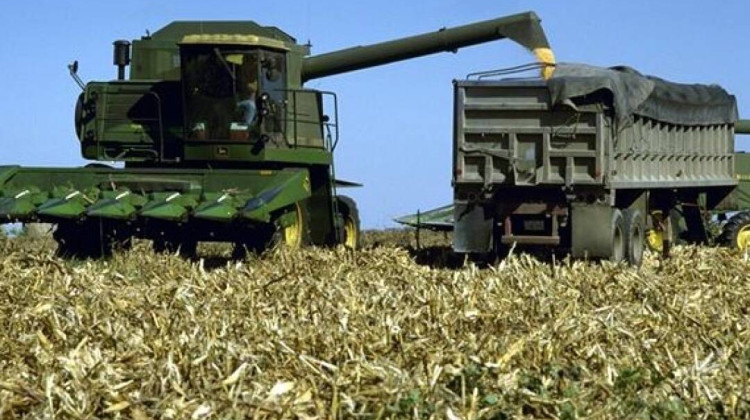
Goodwill of Central and Southern Indiana built the facility to manufacture medical devices for Bloomington-based Cook Medical.
Sydney Dauphinais/WFYILess than a year ago, the corner of 38th Street and Sheridan Avenue offered a mostly empty parking lot and a bus stop. There were no grocery stores within walking distance. Arlington Woods residents worked hard to address food insecurity and other results of historic disinvestment.
The bus stop is still there, and now it sits next to an almost 50,000-square-foot medical device manufacturing plant. The Goodwill Commercial Services facility is a one-story brick building with lofty windows. Right outside is a woodsy courtyard with a small picnic table.
Goodwill of Central and Southern Indiana built the facility to manufacture medical devices, including drainage catheters and needles, for Bloomington-based Cook Medical. And residents collaborated with Goodwill and Cook to ensure the business plan includes significant community investment.
That plan is now launched, including a community-owned grocery store, set to open early next year. And the manufacturing facility opens at least 100 new jobs in the neighborhood. Juanita Easterling, director of plant operations, said all those hired at the time of this reporting were from the community.
And now that it’s open, it hosts wellness and community events for those employees.
“We like to focus on the whole thing here: mind, body, and spirit,” Easterling said.
Those resources include yoga classes, community meetings, and wrap-around services, like professional development, mental health treatment, housing support, and life coaching.
“I don't have to call anybody, I can just say, ‘hey, I have an employee that's facing homelessness. We need some housing support,” Easterling said. “And boom, we got the resource right here.”
Two life coaches are on site, and one of them works specifically with employees who have criminal records. With that life coach, they can go through a re-entry program, New Beginnings. It is one of more than 40 business and social service partners, many nonprofit, that Cook Medical hired to provide community support.
Easterling said those partners help residents break the cycle of poverty.
“We allow the community to use the facility as they wish, you know, because we are here to be a partner,” Easterling said. “We're not here to build on a community, we're here to be a partner with the community.”
Good job access
The Cook Medical facility opened in early May. Goodwill has now hired a fifth of the starting workforce. At the time of this reporting, 20 employees worked in the lab. And Goodwill is still hiring. The goal is to have 100 employees by the end of the year.
“I am proud to say we’re probably one of the only buildings and facilities right now in Indiana that has a waiting list to work,” Easterling said. “I have 100 applicants that have applied to be a supervisor. And then I have a waiting list of 100 from walk-ins, from open interviews, and from online applications.”
The jobs start at $15 an hour, most are full-time, and they include benefits. Those “good jobs” come from a model of corporate social responsibility -- an approach that prioritizes positive impacts on the community as part of business practices.
Cook and Goodwill chose this neighborhood because of its historical disinvestment. In the 1980s and 1990s, industrial giants moved out, one by one, taking the jobs with them. While the suburbs gained high-paying jobs, most growth in the city came from lower-paying jobs. The area’s middle class moved away.
What does the community think?
Longtime northeast Indianapolis resident Dora Figueroa was one of the facility's first employees.
Before working here, she worked in restaurants for nearly 25 years. She started doing basic assembly when the plant opened in May, then, after just a few months, her boss asked her to be a supervisor. She said no other employer had ever offered her a promotion.
“You're gonna be an employee all the time. Just an employee,” Figueroa said. “But when I came over here, I started as a very low employee. And later they made me grow up. I can tell. I like learning every day.”
She is also taking advantage of the company’s tuition aid that can be connected to GED programs. Employees can work towards high school and college degrees on the clock, so they don’t have to sacrifice wages.
She said, before this job, she gave up hope for her high school degree.
“Since coming to this position, my life has been changing so much,” she said. “I can tell you after 25 years, I come over here, and this is my first opportunity to learn and to grow up.”
Figueroa is not alone, many residents said they are pleased by the economic development opportunities. Those opportunities include a community-run grocery store – as many as five grocery stores closed over the past few years, and the neighborhood became a food desert.
Northeastside native Michael McFarland is active in efforts to address food insecurity in the area. He served in the military and said when he returned to the Arlington Woods neighborhood he was devastated.
“I’ve been in third world countries that have better access to food,” McFarland said.
To address that, he and friend Marckus Williams started Wall Street Grocery, a small convenience store on 38th Street. And when Cook Medical and Goodwill chose the neighborhood, they connected with McFarland and Williams.
“We’ve struggled a lot just trying to provide that for our neighborhood,” McFarland said. “So we’re just fortunate to have Cook and Goodwill come along and partner with us and help us provide this necessary item to the neighborhood on a major level.”

McFarland and Williams will run and own Indy Fresh Market, a multi-million dollar full-size grocery store next door to the Cook facility. The market is set to open in the spring of next year. Cook will transfer operations and ownership to McFarland and Williams through a rent-to-own model. Though it's early to predict, McFarland said that with their prospective sales, it won't be long until they have 100 percent ownership of the store.
McFarland said the Cook/Goodwill community investment business model is helping the neighborhood.
“It's no small thing,” McFarland said. “Most people don't have even the smallest support system to help them get over the smallest obstacles.”
He says his brother was recently released from incarceration and hired at the manufacturing facility. He’s been working there for three months. That made it possible for him to buy a car, and he plans to get his own apartment soon.
Is this model replicable?
Ashley Gurvitz, CEO of the United Northeast Community Development Corporation, thinks so – if companies are willing to work directly with communities.
“The first bits of making this happen is identifying who are those other CEOs that have this mission and vision and that also know the importance of having community,” Gurvitz said. “Get out of the boardroom, and get into your community.”
Gurvitz is a longtime resident of the area, and she has been facilitating conversations with community members and stakeholders since the early planning stages for the manufacturing facility. She helped Cook and Goodwill get community input and prioritize community needs – like the grocery store.
“We didn't wait until the vision was done and then say, oh, here are the developers,” Gurvitz said. “And so the moment we found out about the very first group of stakeholders, we involved our residents. I'm like, ‘Hey, we have this potential opportunity. Let me know your feedback.’’’
She said the input is ongoing. A council of residents meets with stakeholders monthly to share feedback, plan events and identify obstacles. That informs how partners come together with the community to work with people facing the effects of disinvestment.
Tom Guevara is the director of Indiana University’s Public Policy Institute. He said this emerging corporate model of prioritizing community reinvestment is seen as an example nationally.
“Normally, the private sector comes in and its part is to build a place where people can be hired and employed, and gain wages,” Guevara said.
He said, traditionally, corporate community investment comes as donations to community organizations, but that's about it.
“[But here] Cook is saying… look, we're going to have to help them overcome some of these other life barriers that have prevented them from gaining greater economic and personal autonomy.”
Contact WFYI economic equity reporter Sydney Dauphinais at sdauphinais@wfyi.org. Follow on Twitter: @syddauphinais.
 DONATE
DONATE







 Support WFYI. We can't do it without you.
Support WFYI. We can't do it without you.